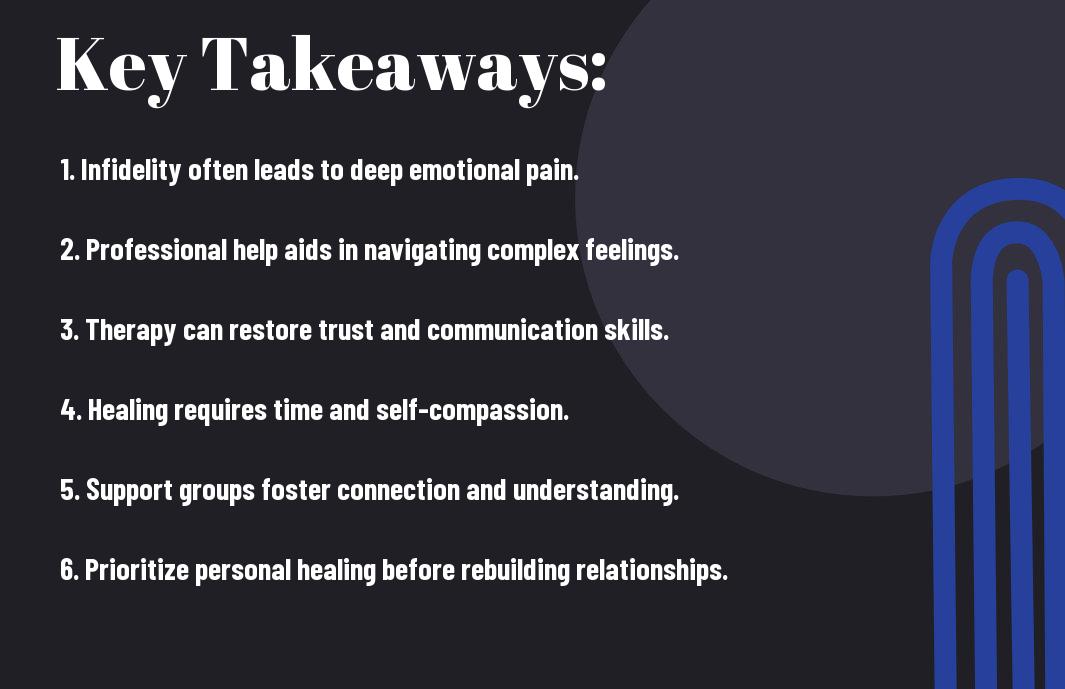Healing from betrayal trauma after infidelity can feel overwhelming, but you are not alone. Understanding how this deep emotional pain affects your mental health is important for recovery. Engaging with a professional can provide you with valuable tools to cope and rebuild your life. Therapy can help you navigate the complex emotions of anger, grief, and betrayal, allowing space for understanding and growth. As you commence on this journey, remember that seeking help is a sign of strength, empowering you to create a healthier path forward.
Key Takeaways:
- Betrayal trauma can deeply affect emotional and mental well-being following infidelity.
- Seeking professional help can provide guidance and tools for processing complex feelings.
- Therapy encourages open communication, allowing individuals to express their thoughts without judgment.
- Coping strategies learned in therapy can aid in rebuilding trust or making informed decisions about the future.
- Support groups can offer validation and shared experiences, fostering a sense of community.
- Healing is a gradual process, and individual timelines for recovery will vary.
- Establishing personal boundaries is vital for self-care and emotional health during the healing journey.


Understanding Betrayal Trauma
Your experience with betrayal trauma can be deeply unsettling, particularly after infidelity. This psychological phenomenon occurs when someone you trust, such as a partner, engages in actions that fundamentally break that trust, leading to emotional and psychological consequences that can linger long after the initial betrayal. Understanding this trauma is an necessary step towards healing and regaining a sense of safety and stability in your life.
Definition of Betrayal Trauma
Betrayal trauma refers to the emotional and psychological impact that results from a significant breach of trust, often by someone in a close relationship. It can lead to intense feelings of hurt, confusion, and a sense of personal violation, making it difficult for you to navigate your emotions and relationships moving forward.
Signs and Symptoms
Beside emotional pain, you may experience various signs and symptoms that indicate betrayal trauma. These can include feelings of anxiety, depression, confusion, and anger. You might also struggle with trust issues, hyper-vigilance, or intrusive thoughts about the betrayal, which can affect your daily life and relationships.
Understanding these signs and symptoms is necessary for recognizing the impact of betrayal trauma on your life. Emotional turmoil might manifest as persistent sadness, anxiety, or even anger towards yourself or your partner. You may also notice physical symptoms, such as changes in appetite or sleep disturbances. Additionally, feelings of isolation can arise, making you withdraw from friends and family. Recognizing these symptoms early can guide you toward seeking the right support and professional help to begin your healing journey.
The Impact of Infidelity on Relationships
Now, infidelity can fundamentally alter the dynamics of any relationship, leading to feelings of betrayal, confusion, and loss of intimacy. Your connection may suffer as trust erodes, compelling you to question the very foundation of your partnership. This emotional turmoil, often accompanied by anger and sadness, can complicate communication and create walls where there was once openness. Ultimately, the impact of infidelity can have lasting consequences, requiring significant effort and healing to move forward.
Emotional Consequences
Above all, infidelity leaves deep emotional scars that can affect your self-esteem and mental well-being. You may feel rejected, inadequate, or unworthy, leading to a rollercoaster of emotions ranging from anger to despair. These feelings can be overwhelming and, if unaddressed, may hinder the healing process and even affect your relationships with others.
Trust Issues
The aftermath of infidelity is often filled with deep-seated trust issues. You may find yourself second-guessing your partner’s every action and doubting their sincerity. This skepticism can lead to excessive questioning or even withdrawal from the relationship altogether, fueling an ongoing cycle of insecurity and distance.
A key aspect of addressing trust issues is acknowledging that they stem from a deep sense of betrayal. You might struggle with thinking that every small lie could lead to another affair, as past experiences overshadow your present. Rebuilding trust takes time and effort, requiring open communication and transparency from both partners. Engaging in couples therapy can help create a safe space for you to express your fears and gradually rebuild your confidence in the relationship.

The Healing Process
All individuals experience betrayal trauma differently; however, the healing process is vital for regaining emotional stability and fostering personal growth. Seeking professional guidance can significantly help you navigate these turbulent times, allowing you to process your feelings, rebuild trust, and establish healthier relationships in the future.
Stages of Healing
Along the journey of healing, you will likely encounter several stages: shock and denial, anger, bargaining, depression, and ultimately acceptance. Each stage serves as a stepping stone toward recovery, enabling you to confront your emotions, understand your triggers, and gradually rebuild a sense of security and self-worth.
Timeframe for Recovery
On average, the timeframe for recovery from betrayal trauma can vary based on individual factors, such as the depth of the trauma and your support network. Healing is not linear, and some days may feel more challenging than others.
Further acknowledging that healing is a personal journey is important. Factors around the depth of betrayal, your emotional resilience, and support systems play significant roles in the recovery timeline. Generally, it may take months to years to fully process your feelings and restore a positive outlook. Engaging in therapy can help facilitate meaningful progress towards healing, empowering you to reclaim your life. It’s important to give yourself grace and recognize that progress may not always be visible, but every step you take brings you closer to healing.
Seeking Professional Help
Despite the emotional turmoil following an affair, you don’t have to navigate betrayal trauma alone. Seeking professional help can provide you with support and guidance as you work through your feelings. It’s important to understand the intricacies of Betrayal Trauma: Signs and How to Start Healing, allowing you to take steps toward recovery.
Types of Therapists
Types of therapists you might consider include:
| Marriage Counselor | Specializes in relationship issues. |
| Psychologist | Focuses on emotional and mental health. |
| Clinical Social Worker | Provides support in a variety of contexts. |
| Trauma Specialist | Experts in healing trauma. |
| Life Coach | Guides personal and professional development. |
Knowing which type of expert to consult can significantly enhance your healing journey.
Benefits of Counseling
Around your healing process, counseling offers a safe, structured environment to express emotions and gain insights about your experiences. Engaging with a therapist can help you build coping strategies and develop a deeper understanding of your personal patterns and triggers.
Plus, counseling provides a space where you can openly discuss feelings of betrayal, hurt, and anger, which is necessary for processing emotions. With the support of a trained professional, you will learn to navigate your healing journey more effectively. As you gain tools for self-reflection and resilience, you’ll find it easier to reconstruct your life and begin to trust again, laying the groundwork for a healthier emotional future.
Therapeutic Approaches for Healing
Unlike conventional talk therapy, specific therapeutic approaches such as Cognitive-Behavioral Therapy (CBT) and Emotionally Focused Therapy (EFT) offer targeted strategies to help you navigate the complexities of betrayal trauma. These methodologies address both the emotional and behavioral challenges that arise from infidelity, allowing for a more structured path to healing.
Cognitive-Behavioral Therapy (CBT)
To support your healing journey, Cognitive-Behavioral Therapy (CBT) focuses on identifying and challenging negative thought patterns associated with betrayal trauma. It empowers you to reframe your experiences, leading to healthier coping mechanisms and improved emotional regulation.
Emotionally Focused Therapy (EFT)
At its core, Emotionally Focused Therapy (EFT) facilitates a deeper understanding of your emotional responses and attachment styles post-infidelity. This approach strengthens your ability to communicate feelings and needs, fostering a sense of safety and connection with your partner.
Due to EFT’s emphasis on emotional bonding, it encourages you to explore your reactions and vulnerabilities in a supportive environment. This can lead to heightened emotional awareness and the ability to express the pain of betrayal without fear of judgment. By rebuilding trust and intimacy through guided conversations, you can create a more resilient relationship foundation, ultimately paving the way for lasting healing and renewed connection. With the right support, you can transform the impact of betrayal into an opportunity for growth and deeper understanding of both yourself and your partner.
Coping Strategies for Couples
Many couples face significant challenges after experiencing infidelity, but adopting effective coping strategies can help you navigate this difficult period. Fostering a supportive and understanding environment is important, as you both work to heal and rebuild your relationship. Engaging in professional therapy together can offer valuable insights and techniques that promote emotional connection and foster a healthier partnership.
Open Communication
Any successful relationship relies on open communication, especially after betrayal. You need to express your feelings, fears, and needs honestly, providing an avenue for your partner to do the same. Creating a space where both of you can share without judgment allows for deeper understanding and healing, paving the way to rebuild your bond.
Rebuilding Trust
Couples must prioritize the process of rebuilding trust after infidelity to create a strong foundation for a healthier relationship. This journey takes time, patience, and consistent effort from both partners. Establishing transparency through honest conversations and setting clear expectations can help rekindle a sense of safety in your partnership. It’s important to acknowledge that trust may not be restored overnight; however, consistent actions and genuine remorse from the betrayer can gradually mend the relationship. Focus on being open and understanding each other’s perspectives as you work together towards lasting reconciliation.
Conclusion
Drawing together the threads of your journey through betrayal trauma can be overwhelming, but seeking professional help is a significant step toward healing. By engaging with a therapist who specializes in infidelity, you can explore your emotions, rebuild trust, and establish healthier relationships moving forward. This support equips you with tools to navigate your feelings and foster resilience, allowing you to emerge stronger and more self-aware. Embrace this opportunity to heal and reclaim your life, as the path to recovery is illuminated by informed guidance and understanding.
FAQ
Q: What is betrayal trauma, and how does it relate to infidelity?
A: Betrayal trauma occurs when a person experiences a deep sense of betrayal from someone they trust, such as a partner. In the context of infidelity, this trauma is compounded by feelings of loss, anger, and confusion, as the betrayed spouse grapples with the violation of their expectations for loyalty and partnership. This emotional turmoil can lead to a range of psychological symptoms, making it necessary to seek professional help for healing.
Q: How can professional help assist in healing from betrayal trauma after infidelity?
A: Professional help can provide a safe space for individuals to process their emotions and experiences related to betrayal trauma. Therapists utilize various therapeutic techniques, such as cognitive-behavioral therapy (CBT) and emotion-focused therapy, to help individuals develop coping strategies, foster self-awareness, and rebuild trust, both in themselves and in future relationships. A professional can guide clients through the complex emotional landscape of infidelity, allowing for constructive healing and growth.
Q: What are some signs that someone may be suffering from betrayal trauma?
A: Individuals experiencing betrayal trauma may exhibit symptoms such as intense emotional distress, intrusive thoughts about the infidelity, difficulty trusting others, persistent feelings of inadequacy or shame, and physical symptoms like anxiety or depression. If these symptoms interfere with daily life or relationships, it may be a sign that seeking professional help would be beneficial.
Q: Is it possible to heal from betrayal trauma completely?
A: While the journey to healing from betrayal trauma can be challenging, many individuals do find a path forward with the right support. Healing does not necessarily mean that the memories of the betrayal will disappear, but rather that individuals can learn to manage their emotional response and create a fulfilling life post-infidelity. Professional support can empower individuals to reclaim their sense of self and build healthier relationships in the future.
Q: How can I find the right professional help for betrayal trauma?
A: Finding the appropriate professional can involve several steps. Begin by seeking recommendations from trusted friends or family or searching online directories for therapists specializing in trauma or relationship therapy. It’s important to check the therapist’s credentials and look for reviews or testimonials. Once you have a few options, schedule initial consultations to find someone with whom you feel comfortable and understood. This connection can significantly impact the healing process.
